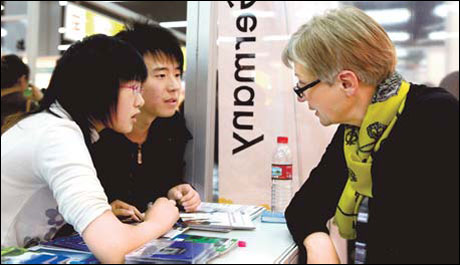
Fan Xiaozhou, a student in the overseas study class at the Experimental High School Attached to Beijing Normal University, didn't sit the university entrance exam.
She has received an offer from a top university in the United States and has decided to go there instead of battling for a place in a Chinese university.
And the 18-year-old is sure she made the right choice.
|
 Two Chinese students consult an educational agent at an international educational fair at China World Trade Center. [Luo Wei / for China Daily] |
"Even if I could go and study at a top Chinese university, I would still have to fight for a job after graduation," she said. "Besides, I prefer the US way of learning because it doesn't require too much memorizing."
And she should know, having already studied in the US, at Sewickley Academy in Pennsylvania during her second year of high school when she went overseas as an exchange student.
Along with Fan, as many as 90, out of the 400 high school seniors from her school, skipped the university entrance examination this year after getting offers from top-50 universities overseas.
Institutions taking the students include Duke, Cornell and Columbia universities, said Su Jianhua, director of the school's international office.
The school has two overseas study classes aimed at students who would like to study overseas.
In addition to the exodus from the Experimental High School Attached to Beijing Normal University, 60 students from No 4 Middle School, 30 from No 8 Middle School and 37 from No 11 Middle School have also received offers from prestigious overseas universities, Beijing Morning Post reported.
No 8 Middle School saw a dozen of its students go abroad last year. This year, the number jumped to 30, according to ifeng.com.
Some media reports estimated that more than 1,000 Beijing high school seniors this year have elected to attend university overseas.
Han Zhijun, a manager with JJL overseas education consulting firm, said there has been a marked shift in why students are going abroad to further their education.
A decade ago, most students studying overseas were unable to get into universities in China. Five years ago, students going abroad turned down offers from average Chinese universities in order to go overseas.
And today, outstanding Chinese students are choosing to study overseas instead of going to top domestic universities.
And most of the students are financially supported by scholarships granted by the overseas institutions.
"The experience of studying abroad has proven to be a lifelong benefit," Han said. "It can broaden students' horizons, enhance their understanding of the advanced education system and improve their independence."
For Fan, it also means more hard work.
"For students who take the university entrance exams, they only need to study hard for the final year of high school. The next four years of university life will be stress-free," she said.
"But if I get the chance to study in the US, I will study hard and I'll cherish every moment there."
Fan said her parents have been very supportive of her decision to spend her college years overseas, even though a four-year undergraduate program will cost them about one million yuan.
"They said the experience will be good for my future," she said.
However, educators worry that the trend may lead to an outflow of talent.
China Central Television reported that since 1978, 1.06 million people have gone overseas to study - and only 275,000 have returned to China.
Wang Huiyao, director of the Center for China and Globalization, said many talented people gravitate to developed countries not because of a talent surplus in China but because there is a lack of educational and social resources for them here.
"China has a huge demand for upper and high level elites at the current state of rapid economic development," he said in an interview with Beijing Youth Daily.